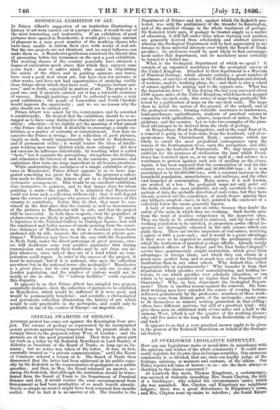HISTORICAL EXHIBITION OF ART.
Jr Prince Albert's suggestion of an institution illustrating a history of art were carried out in a proper place, it would be one of the most interesting and instructive. If an exhibition of good pictures were opened in Manchester, it would give a large amount of pleasure to a very Feat number of the working classes who have been unable to inform their eyes with works of real art. But the two projects are not identical, and, no royal influence can make them so. A Manchester gentleman conceived the liberal idea of presenting before his townsmen on the spot a good exhibition. The working classes of the country generally, have attained a degree of cultivation much above that which they enjoyed some years back ; men of active mind, who assist in stimulating the minds of the whole and in guiding opinions and tastes, have read a good deal about art, but have seen few pictures or other works and have not had opportunities of studying visibly' those thing; about which they have read. " Segnius irritant am- ines," and so forth, especially in matters of art. The project is a good one, and if properly carried out it has a tolerable certainty of success. Enough paintings could be collected to make a very good exhibition • the people of Lancashire and North Cheshire would improve the opportunity ; and we see no reason why the plan should not be carried out. • Prince Albert was asked for his countenance, and he accorded it conditionally. He desired that the exhibition should be so ar- ranged as to have some distinctive character and some permanent utility ; otherwise—if we rightly get the meaning of what passed. —the Prince did not think it desirable to encourage a simple ex- hibition as a matter of curiosity, or entertainment. Now here we conceive the Prince is wrong; for a collection of good pictures, simply as such, would unquestionably be useful to Manchester, and of permanent utility; it would render the ideas of intelli- gent working men more distinct while more enlarged. Art does not exercise its influence didactically, by teaching what is called "facts," but it expands the perceptions strengthens the feelings, and stimulates the interest of men in the emotions, passions and aspirations that form one large ingredient in all human greatness. While underrating the usefulness of a simple exhibition of pic- tures in Manchester Prince Albert appears to us to have sug- gested something too great for the place. He proposes a collec- tion made to illustrate the history of art in a chronological and systematic arrangement. This would be an excellent exhibition, very instructive to painters, and to that larger class for whom painting is made—the public. It is admitted that Manchester could not form such a collection without aid ; that it will depend upon the owners of paintings who possess the art-treasures of this country to contribute. Before they do that, they must be con- vinced in the first place that the custody as well as transmission of the pictures to Manchester will be safe, and that the project will be successful. In both these respects, even the prejudices of picture-owners are likely to militate against the plan. If smoke is injurious to the National Gallery in Trafalgar Square, how will the condensed and bulky masses of smoke pouring from the count- less chimneys of Manchester, as from a thousand steam-boats anchored side by side, improve the art-treasures of private gen- tlemen 14 Whatever may have been the case with the Exposition in Hyde Park, under the direct patronage of great persons, own- ers will desiderate some very positive guarantee that during transmission and custody their works may be safe from any in- jury whatever, since indeed they are of a kind which no com- pensation could repair. In order to the success of the project, it must be national ; but if it is national, why open the collection anywhere but in the national town—the metropolis ? Manchester is a great place but its own population is only one to nine of London population, and the number of visitors would not be nearly as one in nine. No "railway facilities" could equalize this disparity.
It appears to us that Prince Albert has mingled two projects esitentia.lly distinct—first, the collection of pictures to be exhibited in Manchester, which would be sufficient if it were good, and would be permanently beneficial ; and secondly, a chronological and systematic collection illustrating the history of art, which would be only practicable in the metropolis, and could only be profitable in one of the centres of Europe—an imperial city.


























 Previous page
Previous page